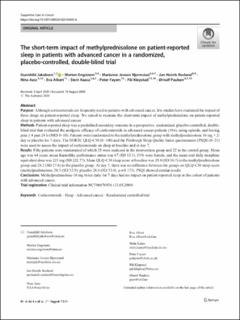The short-term impact of methylprednisolone on patient-reported sleep in patients with advanced cancer in a randomized, placebo-controlled, double-blind trial
Jakobsen, Gunnhild; Engstrøm, Morten; Hjermstad, Marianne Jensen; Rosland, Jan Henrik; Aass, Nina Kathrine; Albert, Eva; Kaasa, Stein; Fayers, Peter; Klepstad, Pål; Paulsen, Ørnulf
Peer reviewed, Journal article
Published version

Åpne
Permanent lenke
https://hdl.handle.net/11250/2686278Utgivelsesdato
2020Metadata
Vis full innførselSamlinger
Sammendrag
Purpose: Although corticosteroids are frequently used in patients with advanced cancer, few studies have examined the impact of these drugs on patient-reported sleep. We aimed to examine the short-term impact of methylprednisolone on patient-reported sleep in patients with advanced cancer. Methods: Patient-reported sleep was a predefined secondary outcome in a prospective, randomized, placebo-controlled, double-blind trial that evaluated the analgesic efficacy of corticosteroids in advanced cancer patients (18+), using opioids, and having pain ≥ 4 past 24 h (NRS 0-10). Patients were randomized to the methylprednisolone group with methylprednisolone 16 mg × 2/day or placebo for 7 days. The EORTC QLQ-C30 (0-100) and the Pittsburgh Sleep Quality Index questionnaire (PSQI) (0-21) were used to assess the impact of corticosteroids on sleep at baseline and at day 7. Results: Fifty patients were randomized of which 25 were analyzed in the intervention group and 22 in the control group. Mean age was 64 years, mean Karnofsky performance status was 67 (SD 13.3), 51% were female, and the mean oral daily morphine equivalent dose was 223 mg (SD 222.77). Mean QLQ-C30 sleep score at baseline was 29.0 (SD 36.7) in the methylprednisolone group and 24.2 (SD 27.6) in the placebo group. At day 7, there was no difference between the groups on QLQ-C30 sleep score (methylprednisolone 20.3 (SD 32.9); placebo 28.8 (SD 33.0), p = 0.173). PSQI showed similar results. Conclusions: Methylprednisolone 16 mg twice daily for 7 days had no impact on patient-reported sleep in this cohort of patients with advanced cancer.